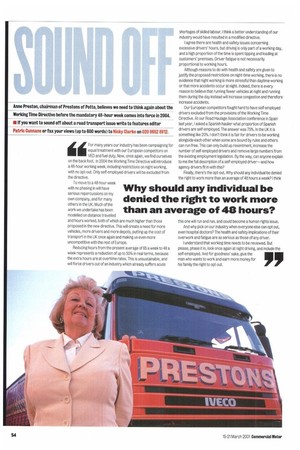dd For many years our industry has been campaigning for
Page 56

If you've noticed an error in this article please click here to report it so we can fix it.
equal treatment with our European competitors on VED and fuel duty. Now, once again, we find ourselves on the back foot, In 2004 the Working Time Directive will introduce a 48-hour working week, including restrictions on night working, with no opt-out. Only self-employed drivers will be excluded from the directive.
To move to a 48-hour week with no phasing in will have serious repercussions on my own company, and for many others in the UK. Much of the work we undertake has been modelled on distance travelled and hours worked, both of which are much higher than those proposed in the new directive. This will create a need for more vehicles, more drivers and more depots, putting up the cost of transport in the UK once again and making us even more uncompetitive with the rest of Europe.
Reducing hours from the present average of 65 a week to 48 a week represents a reduction of up to 50% in real terms, because the extra hours are at overtime rates. This is unsustainable, and will force drivers out of an industry which already suffers acute shortages of skilled labour. I think a better understanding of our industry would have resulted in a modified directive.
I agree there are health and safety issues concerning excessive drivers' hours, but driving is only part of a working day, and a high proportion of the time is spent tipping and loading at customers' premises. Driver fatigue is not necessarily proportional to working hours.
Although reasons to do with health and safety are given to justify the proposed restrictions on night-time working, there is no evidence that night working is more stressful than daytime working or that more accidents occur at night. Indeed, there is every reason to believe that running fewer vehicles at night and running them during the day instead will increase congestion and therefore increase accidents.
Our European competitors fought hard to have self-employed drivers excluded from the provisions of the Working Time Directive. At our Road Haulage Association conference in Spain last year, tasked a Spanish haulier what proportion of Spanish drivers are self-employed. The answer was 75%. In the UK it is something like 20%. I don't think it is fair for drivers to be working alongside each other when some are bound by rules and others can run free. This can only build up resentment, increase the number of self-employed drivers and remove large numbers from the existing employment legislation. By the way, can anyone explain to me the full description of a self-employed driver—and how agency drivers fit in with this?
Finally, there's the opt-out. Why should any individual be denied the right to work more than an average of 48 hours a week? I think th,s ore wll run and run, and could become a human rights issue.
And why pick on our industry when everyone else can opt out, even hospital doctors? The health and safety implications of their overwork and fatigue are as serious as those of any driver.
I understand that working time needs to be reviewed. But please, phase it in, look once again at night driving, and include the self-employed. And for goodness' sake, give the man who wants to work and earn more money for his family the right to opt out.












































































































